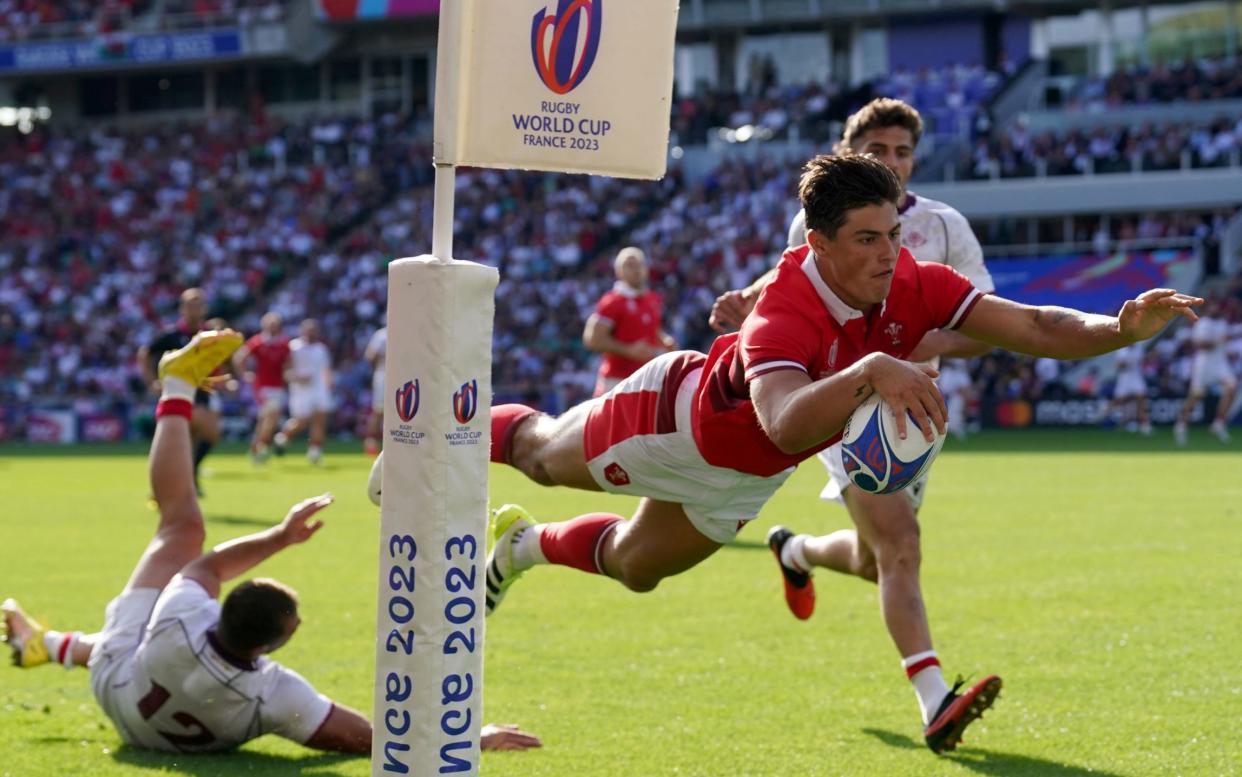Louis Rees-Zammit leaving rugby underlines just how small game’s global footprint is

- Oops!Something went wrong.Please try again later.
- Oops!Something went wrong.Please try again later.
- Oops!Something went wrong.Please try again later.
- Oops!Something went wrong.Please try again later.
“It is nothing about rugby,” said Louis Rees-Zammit, explaining his bombshell decision to turn his back on the game with such breath-taking haste that it did justice to his ‘Rees-Lightning’ nickname on the field. “It is about my ambition to make my dream come true and play in the National Football League (NFL).”
The 22-year-old went on to explain that his father, who had played American football for Cardiff Bay Tigers back in the day, had raised him to love the sport as a boy, and that this decision was about trying to make him proud.
The untold riches available for those who make it in the most lucrative team sport in the world would also have been an influencing factor. Just weeks ago he was considering lucrative offers from clubs in Japan and France, then, last weekend, he received an offer to try out for the NFL’s 10-week international player pathway. Seasoned NFL observers regard it as an extremely long-shot, but graduates such as Jordan Mailata, a former rugby league player in Sydney, is on a $64 million (£50.6 million) contract with the Philadelphia Eagles.
As one of the fastest wingers to have played the game in these isles, it immediately raised the question: who could blame him? Rees-Zammit is not the first rugby union player to try to crack America, with Christian Wade, the former Wasps wing, the last of a line who have tried but failed. And it has not always been the speedsters. Just over a decade ago, Hayden Smith, the former United States and Saracens lock, managed to cut through briefly for the New York Jets, while back in 2003 former Ireland fly-half Ronan O’Gara took a phone call from the owner of the Miami Dolphins about filling a role for them as a kicker.

Just as the likes of Henry Arundell have opted to remain in France with Racing 92 for a couple of years, forgoing the opportunity to play for England until mid-way through the four-year World Cup cycle, Rees-Zammit’s gamble could be seen as a similar nothing-to-lose short-term break from the game.
And yet his decision to turn his back on the game that made him the poster boy of the Welsh game, also said everything about rugby. Particularly its place in the world order of professional sport. Rugby union has spent the last two decades trying to tap into the vast commercial landscape of the American sports industry.
That one of the game’s most high-profile young superstars – he already has 31 Wales caps and represented the British and Irish Lions on the tour of South Africa two years ago – is prepared to give it up within the space of 24 hours for what most people regard as a near mission impossible, comes as a reminder as to just how small rugby union’s global footprint remains.
By lunchtime on Tuesday his biography on Wikipedia had been amended to “a Welsh former rugby union wing.”
At a time when the Premiership and the Six Nations is trying to grow its global audience to lose such a marketable and box office player can only been seen as a major blow. Rees-Zammit is set to be one of the central characters in the new Netflix fly-on-the-wall documentary on last year’s Six Nations Championship. It is unlikely their camera crew for next year’s series will have been quick enough to catch his departure, given that Wales head coach Warren Gatland received a call to inform him of the news only 30 minutes or so before he was due to announce his Six Nations squad at the Vale of Glamorgan hotel on Tuesday.
It is understood that Gloucester, who had recruited Rees-Zammit from Hartpury College as a teenager, were equally caught unawares the previous day by his impending departure.
But again perspective is important. There are many more serious issues facing professional club rugby at present as the game continues to pick up the pieces after the devastating impact of the global pandemic. And there is a counter-argument that the whole affair will raise rugby’s profile, whether he makes it or not. That a club like Gloucester can develop an athlete that has an outside chance to make it in the NFL is a statement in itself.
There is also the view that Rees-Zammit who has recently joined the Roc Nation Sports International, the agency owned by Jay-Z who have Marcus Smith, Maro Itoje and Siya Kolisi among their clients, is seizing a once-in-a-lifetime opportunity knowing that he could return to rugby, perhaps even by the start of next season, if the move does not work. Gloucester are currently struggling near the bottom of the Premiership table but without any jeopardy of relegation while Wales are at the start of a new four-year World Cup cycle, so why not roll the dice? As Lawrence Dallaglio posted on X on Tuesday, if he was still playing now, he “would consider 12 months in Japan post RWC to freshen up.”
It was left to Gatland to sum up another crazy day in the sport. “There’s never a dull moment in Welsh rugby,” he said. “Things have moved fast in the last 24 hours. It’s probably shock more than disappointment. There aren’t a lot of people who make it in the NFL who haven’t been brought up with the game and played it at a young age. It’s going to be a challenge. Good luck to him.”
